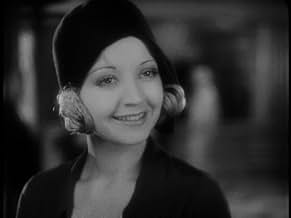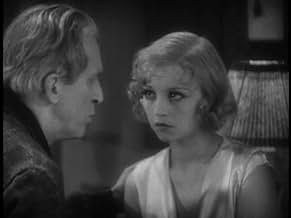Aggiungi una trama nella tua linguaSheba has a dull boyfriend and seems destined for a dull marriage when she meets a rich playboy who has money to burn and places to go. She gets involved with the playboy and never seems to ... Leggi tuttoSheba has a dull boyfriend and seems destined for a dull marriage when she meets a rich playboy who has money to burn and places to go. She gets involved with the playboy and never seems to notice that he might be shady and untrustworthy.Sheba has a dull boyfriend and seems destined for a dull marriage when she meets a rich playboy who has money to burn and places to go. She gets involved with the playboy and never seems to notice that he might be shady and untrustworthy.
- Regia
- Sceneggiatura
- Star
- Undetermined Role
- (non citato nei titoli originali)
- Police Sgt. Mulligan
- (non citato nei titoli originali)
- Bus Passenger at Window
- (non citato nei titoli originali)
- Railroad Ticket-Seller
- (non citato nei titoli originali)
- Pirate's Den Waiter
- (non citato nei titoli originali)
- Detective
- (non citato nei titoli originali)
- Nightclub Patrol
- (non citato nei titoli originali)
- Specialty Dancer
- (non citato nei titoli originali)
Recensioni in evidenza
White is adorable and gets to sing "You Learn About Love Every Day." It's her only song but the nightclub acts sing a few more, including "You're My Captain Kidd" and "That's the Lowdown on the Lowdown." By 1930 audiences were tired of backstage musicals so filmmakers moved the numbers out front, which made them more realistic.
Morris and Bakewell are good, and then there's Marion Byron as the jazzy phone operator in the office where White works. White and Byron had also starred together in Broadway BABIES. Maurice Black is good as Joe the Bartender who gets suckered by Morris. Richard Carlyle plays White's father. And in a humorous tenement bit, Nellie Nichols and Ann Brody play a pair of immigrant gossipers who hang out their windows and exchange news in fractured English.
PLAYING AROUND was one of five films White starred in in 1930. In 1931, she had her final starring role in THE NAUGHTY FLIRT.
Worth a look for Alice White and some snappy pre-Code dialog.
Although director Mervyn Leroy keeps things moving at a slightly stodgy pace in the dialogue, and Miss White seems to be a nitwit, there are some nice points to this movie. For one, there are a few songs by Sam Stept and Bud Green -- and no, I don't think I've heard of them before either. Miss White sings "You Learn About Love Every Day", and it's a good song, with the tune reprised a couple of times. Another song, "That's The Lowdown on the Lowdown" is an okay piece, but it's given a fine performance by Carolynne Snowden. In addition, there's a fine moving shot with talking going on. Since this was finished and copyrighted in 1929, someone should have told the sound engineer Earl Sitar you couldn't do that, not in Hollywood. He was suitably punished by being uncredited, and being stuck in the B movies.
Although there's a lot to kvetch about here, the things that it does right outweigh those easily, particularly Morris' performance, clearly meant for a star build-up. With Richard Carlyle, Marion Byron, and George "Gabby" Hayes with his teeth in.
What can I say, this is a creaky old morality tale, but I'm a sucker for Alice White and that fact bumped up my review score. She plays a daddy's girl who's dating a stable guy (William Bakewell) she thinks is boring, as evidenced by him eyeing the expensive drinks menu at a nightclub and deciding the buttermilk is about all he can spring for. Despite taking place during the Prohibition era, beer is included in a list of non-alcoholic drinks and one gets the idea there are lot more on offer, but regardless, at $0.40 for the milk and with a cover charge of $1.50 a guest in 1930, which would come to $66 in 2025, he has a point. After she goes onstage on a whim to appear in a "pageant of the knees", where behind a curtain down to knee-level she and other young women strut around so that their legs can be judged (ooh la la), a playboy (Chester Morris) with a fancy car takes an interest in her. The trouble is, despite all his smooth talking, he's a phony, owing money all over town. She's of course smitten with him and his big, er, car, cooing "There's an automobile horn that's really got sex appeal."
It's obvious where this is going to go from there, but it was mildly surprising in how it got there, albeit contrived and poorly scripted. To be honest, it's kind of hard to really like the "good guy" as he's kind of a sap, and also because he quips "It's all right honey, women can't be expected to judge human nature like us men" when delivering the film's final judgment. There are other little bits that make up for that though, including Alice White singing "You Learn About Love Every Day" (obviously playing into the moral of the story), the agile Doris McMahon contorting herself in that early stage show, and Marion Byron as the savvy fast-talking co-worker. I also absolutely loved seeing Carolynne Snowden and her leggy dancing ensemble perform "That's the Lowdown on the Lowdown" near the end of the film. It's the women in this film that made it mildly enjoyable, despite its old-fashioned script.
The film starts out in a nightclub named "The Pirate's Den". A big pirate-themed production number that looks like something that didn't make the final cut in Warner's revue "The Show of Shows" takes up the first five or so minutes - but Alice is nowhere in sight at this point. After the show is over, our stars appear. Sheba and Jack (Alice White and William Bakewell) are out for a night on the town, but Jack gets a headache when he looks at the prices on the menu. At the club at the same time is Nickey Solomon (Chester Morris) who seems to be a likable fellow who enjoys living well. However, he has one major character flaw - his profession is holdup man. Fortunately for the patrons of the club, this is his night off. He and Sheba meet when the club has a "legs contest" in which the female patrons are invited to participate. The curtain is lowered on the stage so you can just see the legs of the participants, and the girls then parade around the stage. Nickey is named judge, and he picks Sheba's legs as the winner(s). When the curtain is raised he sees the rest of Sheba and Nickey is quite taken by the entire package.
From this point on Nickey is wooing Sheba, and Jack, who is just a 35 dollar a week soda jerk, is having a hard time competing. The scale is weighed even more heavily in Nickey's favor due to the fact that he is a rather talented liar who has Sheba believing he is a successful businessman. Chester Morris was excellent at playing an evil guy with a nice guy facade, but here you never see the really nasty side of his nature except for one scene. Nickey makes one serious mistake for a holdup guy - driving your own car to robberies and then blowing its unique sounding horn.
This film has Alice singing only one number. Besides the opening production number there is another big costumed production number towards the middle of the film also staged at "The Pirates Den". The supporting roles are played well here too. There are a couple of older ladies that live across the alley from Sheba and her father that are always gossiping, and the part of Sheba's poor but loving father is played with heart by Richard Carlyle. Recommended for fans of early talkie fare if it ever crosses your path. In the 16 years I've been watching Turner Classic Movies I don't recall it ever being aired there.
Lo sapevi?
- QuizIn September 1928 Warner Bros. Pictures purchased a majority interest in First National Pictures and from that point on, all "First National" productions were actually made under Warner Bros. control, even though the two companies continued to retain separate identities until the mid-1930s, after which time "A Warner Bros.-First National Picture" was often used.
- Citazioni
Jack: Gee, you look sweet, Sheba. Yuh gotta date?
Sheba Miller: Yes. I'm gonna see Al Jolson.
Jack: Yuh haven't got a date with *him*, have you?
Sheba Miller: Don't be an eggnog - I'm going to the movies with Maude.
- Curiosità sui creditiAfter the end title, there is a series of clips, accompanied by a reprise of "You Learn About Love Every Day." Needless to say, this was extremely unusual in that era.
- Versioni alternativeThis movie was also released as a silent film, but no details are known.
- Colonne sonoreYou're My Captain Kidd
(1929) (uncredited)
Written by Sam H. Stept and Bud Green
Performed by Carolynne Snowden and chorus at the nightclub
I più visti
Dettagli
- Data di uscita
- Paese di origine
- Lingua
- Celebre anche come
- Playing Around
- Luoghi delle riprese
- Azienda produttrice
- Vedi altri crediti dell’azienda su IMDbPro
- Tempo di esecuzione
- 1h 6min(66 min)
- Colore


























